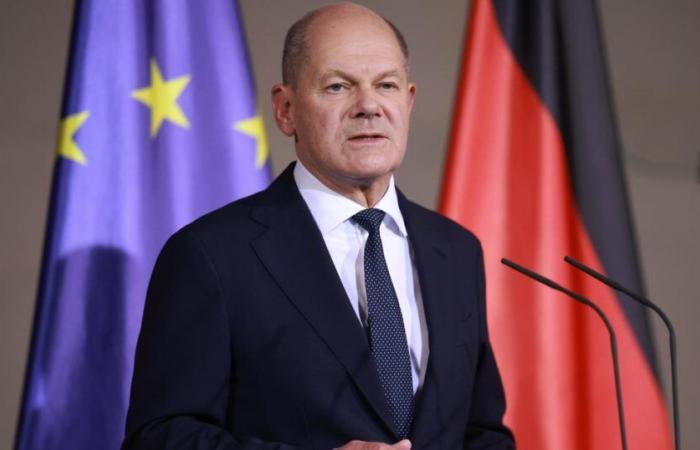
German Chancellor Olaf Scholz called Vladimir Putin on Friday for the first time in two years. This “diplomatic event” on a European scale reflects the difficulties of the German leader, who seems to want to set himself up as a “chancellor of peace” in view of the upcoming legislative elections.
According to information provided by both sides, the call between Moscow and Berlin, which lasted an hour, was rather tense and positions remained largely unchanged.
The Kremlin thus indicates that Olaf Scholz “reiterated his position which is well known and repeated several times a day by all European politicians like a mantra” while, according to the German government, the chancellor asked Russia to show his “desire to begin negotiations with Ukraine with a view to a just and lasting peace”.
According to the German daily Der Spiegel, citing government sources, the chancellor wanted to “confront” Vladimir Putin with the reality of the war and the critical view that certain countries have on Russia.
>> Monitoring the situation in Ukraine: kyiv must do everything to end the war in 2025 through diplomacy, insists Volodymyr Zelensky
A German-Russian appel here fâche Zelensky
Despite everything, this unprecedented exchange since the start of the Russian invasion in Ukraine made Ukrainian President Volodymyr Zelensky jump. And for good reason: it comes in the wake of the re-election of Donald Trump as president of the United States, a future tenant of the White House who wants to push Europe to “take its responsibilities” to defend Ukraine.
But conversely, this resumption of contact with the man who was an absolute undesirable in Germany for more than two years can be interpreted as a bad sign from the Ukrainian point of view, while kyiv has instead been asking for months for an increase in European aid to defend itself against Moscow.
>> Maurine Mercier's explanations in Forum:
A chancellor in the campaign
On the domestic front, if Olaf Scholz seeks to establish himself as “chancellor of peace”, it is also because the social-democrat leader is on the electoral campaign with a view to the legislative elections scheduled for the end of February. His heterogeneous coalition was in fact shattered following the dismissal of liberal Finance Minister Christian Lindner, due to disagreements that had become insurmountable in terms of economic and budgetary policy.
>> Read about it: Germany should vote on February 23 for its early legislative elections
Weakened and more unpopular than ever, Olaf Scholz hopes to bounce back in these upcoming elections, but he is not in a good position: the SPD is only third in the polls, far behind the conservatives (CDU/CSU) and the far right (AfD). But the chancellor launched his campaign with determination, defending his record and his country's support for Ukraine.
Germany's foreign and defense policy will be at the center of the campaign. The 66-year-old chancellor reaffirmed on Wednesday that kyiv could “count” on Germany and its “solidarity”.
Strong criticism from the opposition
But Olaf Scholz is under fire from the conservative opposition, who accused him on Saturday of having contributed to a “propaganda success” for Moscow through his telephone call to the Russian president. Vladimir Putin “will take the fact that Scholz called him more as a sign of weakness than of strength,” the CDU foreign policy spokesman said on the radio.
Olaf Scholz “above all wanted to make it understood, in Germany, that he is the one who relies on negotiations, on dialogue”, he accused, believing that this effort is in vain: Vladimir Putin understands “only signals of strength”, such as the threat to massively increase military aid to Ukraine, he said. He finally criticized the chancellor for not having made any “new concrete proposals” and for not having “set a quasi-ultimatum”.
“It’s over, everyone knows it now,” the popular newspaper Bild scathed in an editorial.
The general secretary of the SPD, for his part, defended the outgoing chancellor's approach, saying that it was “important to make diplomatic progress”.
Pierrik Jordan/boi with dpa





